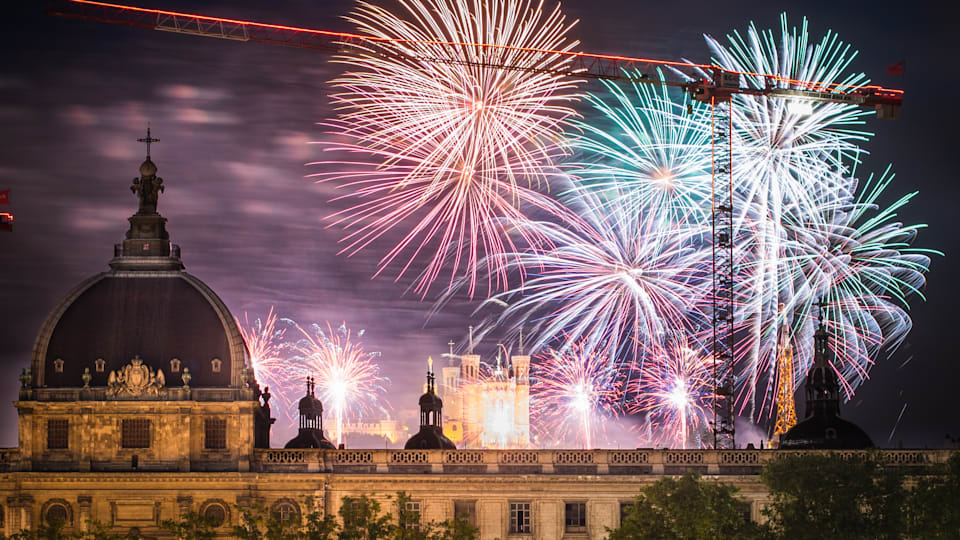Bastille Day: Everything you need to know about 14 July as Paris welcomes the Olympic Torch Relay

Today is 14 July, and for millions of people around France it’s a national day of celebration for a date more commonly known as Bastille Day.
But do you know the origins of Bastille Day and why it’s celebrated on 14 July?
Find out everything you need to know about France’s national day and what makes this year's celebrations so unique with the Olympic Games Paris 2024 around the corner.
Why is 14 July called Bastille Day?
On 14 July 1789, as social and political tensions rose across France, protesters took to the Parisian streets to express their opposition to their King and Queen. The mob grew in size and went on to attack the Bastille, a royal fortress and prison, leading to the eventual collapse of the monarchy.
This period, after which the country gained independence and led to the creation of the French Republic, became known as the French Revolution.
Annual celebrations have since been held across the country to mark this date, with the most spectacular - a military parade down the Champs-Élysées followed by a breathtaking firework display – attended by the French President as well as other officials and foreign dignitaries.
This year’s celebrations will reach fever pitch as the Olympic torch arrives in the capital to great fanfare. Nothing could send a more powerful message of Liberté, Egalité, Fraternité (Liberty, Equality, Fraternity) than the Olympic torch weaving its way around Paris.
Fireworks light up the Eiffel Tower as part the annual Bastille Day Celebrations on July 14, 2021 in Paris, France.
Where can you see the Olympic Torch Relay in Paris on 14 July?
On 14 July 2024, the Olympic torch will arrive in Paris and be held aloft down the Champs-Élysées, past the Grand Palais and Petit Palais, before traversing through the Jardin du Luxembourg, a 25-hectare green oasis in the heart of the city.
From there, it will head towards the prestigious Place Vendôme and on to the Louvre, which houses some of the world’s most treasured artefacts, before advancing to the Centre Pompidou, home to the largest collection of modern and contemporary art in Europe.
The Olympic torch will then be carried to the celebration site located at the Place de l'Hôtel de Ville.
You can find more information about the Paris stages of the Olympic Torch Relay on Olympics.com.
The Phrygian cap: an important French symbol for the Olympic Games Paris 2024
Many iconic symbols have been chosen by Paris 2024 to connect French history and culture to the Games.
The most widely-known, the Phrygian cap, is the mascot of Paris 2024 and has become a familiar image in France.
As Paris 2024’s vision is to demonstrate that sport can change lives, the red, white and blue mascots – the colours of France’s tricolour flag – will play a key role in leading a revolution through sport.
The Phrygian caps, a symbol of the French Revolution, can even be seen on the French national icon Marianne, who is depicted on statues that stand proudly outside every town hall in the country, and even on the country's stamps.
Marianne is an emblem of the French Republic and a familiar face in French culture; the embodiment of the bold spirit of creativity that has inspired these Olympic Games.
Paris 2024 Olympic marathon
Aside from symbols, Paris 2024 will also be the occasion to promote French culture through sporting events – the most significant being the Olympic marathon.
While the race will undoubtedly be a thrilling dash to the line, there is also historic importance to the Paris blue riband event.
The route has been inspired by ‘La Marche des Femmes’ (the Women’s March on Versailles), when on 5 and 6 October 1789, a group of women walked from the Paris City Hall to the Palace of Versailles and forcibly took the King to ‘Les Tuileries’.
Thanks to pressure from this group of women, King Louis XVI ratified the famous Universal Declaration of Rights of Man and of the Citizen just months after the French Revolution.
As 14 July has become a symbol of peace and freedom throughout the years, it will be especially poignant moment for the Olympic Games in 2024.